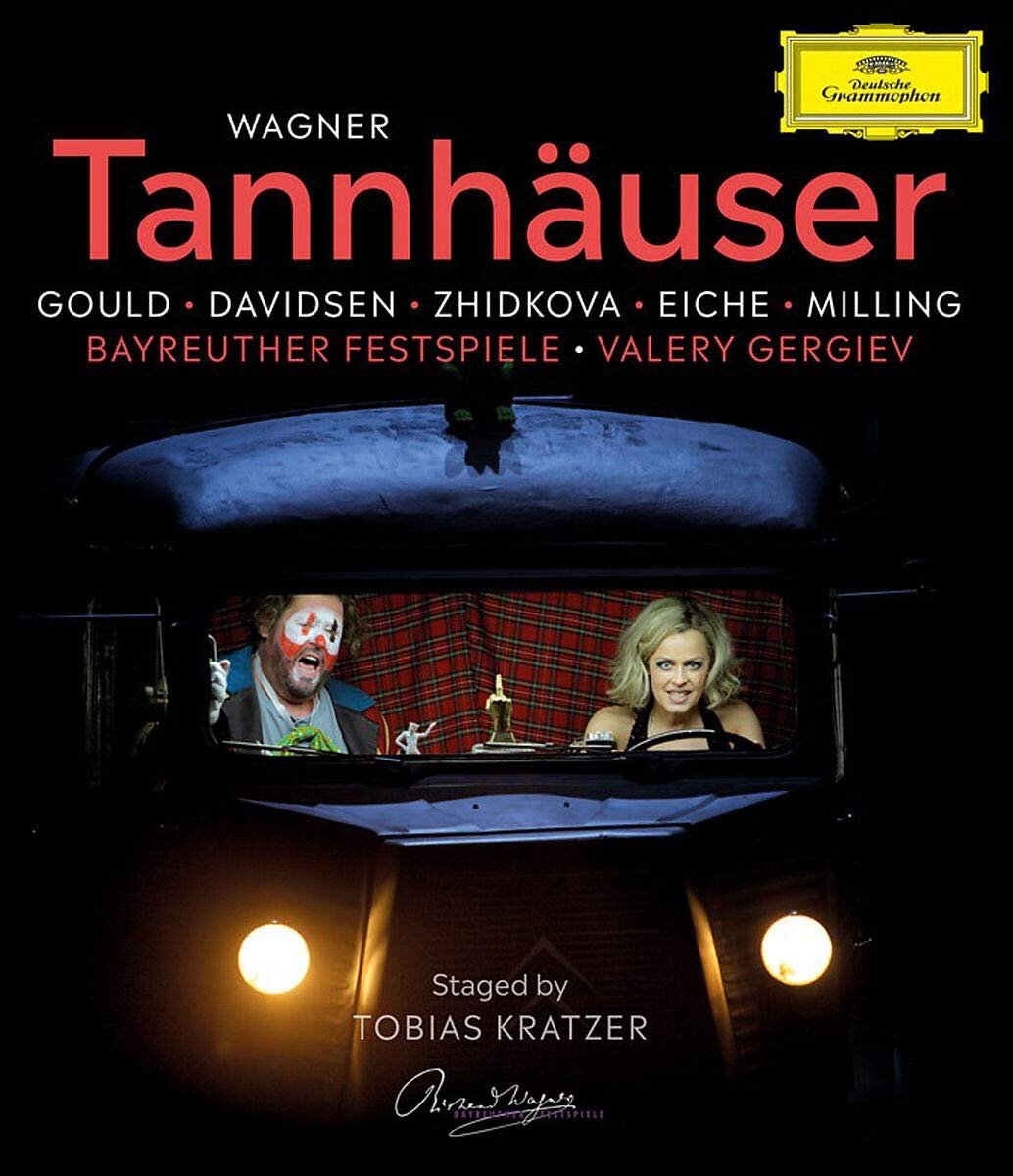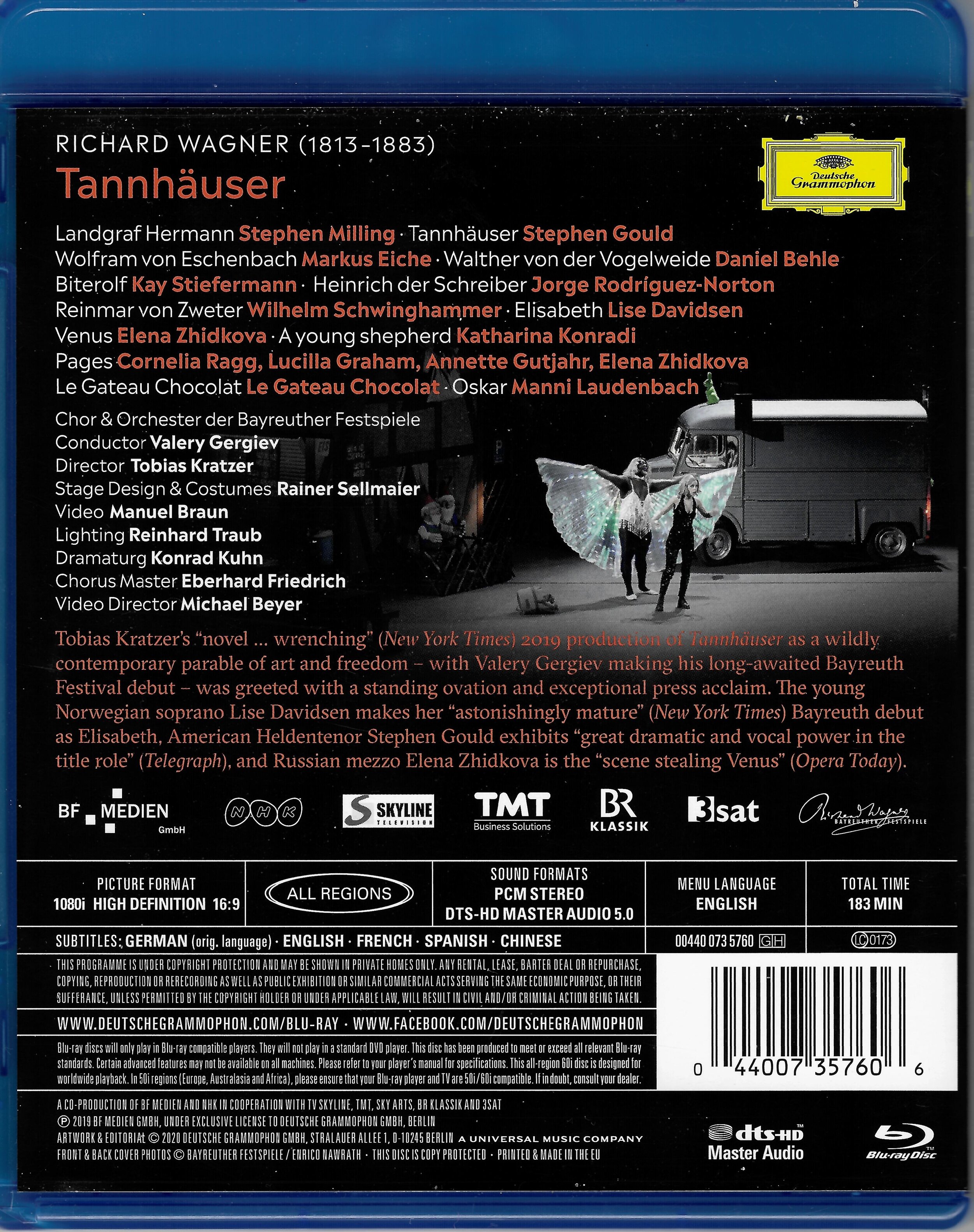

Wagner Tannhäuser opera to libretto by the composer. Directed 2019 by Tobias Kratzer at the Bayreuth Festival. Stars Stephen Gould (Tannhäuser), Lise Davidsen (Elisabeth), Elena Zhidkova (Venus), Markus Eiche (Wofram von Eschenbach), Stephen Milling (Landgraf Hermann), Daniel Behle (Walther von der Vogelweide), Kay Stiefermann (Biterolf), Jorge Rodríguez-Norton (Heinrich der Schreiber), Wilhelm Schwinghammer (Reinmar von Zweter), and Katharina Konradi (Ein junger Hirt), Le Gateau Chocolat (Le Gateau Chocolat), and Manni Laudenbach (Oskar). Valery Gergiev conducts the Bayreuth Festival Orchestra and Chorus (Chorus Master Eberhard Friedrich). Set and costume design by Rainer Sellmaier; lighting by Reinhard Traub; video by Manuel Braun; dramaturgy by Konrad Kuhn. Directed for TV by Michael Beyer. Sung in German. Released 2020, disc has 5.0 dts-HD Master Audio sound. Grade: A+
As the famous Tannhäuser Overture music begins, we are immediately thrown into a mini-opera explaining how Tannhäuser got tired of living with Venus. The mini-opera was shown at Bayreuth as a video, and we in the home theater probably see it better than the live audience did. Tannhäuser, dressed as a clown, is played by Stephen Gould, who has sung the role on stage more than 100 times. Driving the old minibus is a skinny Venus played by Elena Zhidkova, who masterfully created this role after emerging from sea-foam onto the stage a day or so before showtime (following an accident that wiped out the scheduled soprano). With the two lead stars are two characters appearing (I think) for the first time in an opera (and probably their last time): The Chocolate Cookie (Le Gateau Chocolat) and Manni Laudenbach, a little person representing the Oskar Matzerath character from the Günter Grass novel Die Blechtrommel (The Tin Drum). With his mini-opera director Tobias Kratzer fulfills the first requirement in his contract with Bayreuth: to present something outrageously provocative and offensive to opera conservatives so as to support current management in their eternal effort to shake off the stigmas of German antisemitism and association with Adolf Hitler:
Next we see our heroes at a Burgerking theme park where they plaster up signs quoting Wagner’s motto: “ Free in desire, action, and enjoyment.” But after the heroes murder a cop in a blotched robbery, Tanny wants to get off the bus:
Better shots of Cookie and Oskar:
Now Tanny is magically back at Wartburg, except Wartburg is the Bayreuth Theater and the pilgrims are opera patrons dressed to kill. Here Kratzer checks off the next requirement in his contact: to make his Bayreuth show self-referential. Note the girl with the bike: she is Eliana Bayón, an incredibly beautiful soprano voice in the tiny role of the Young Shepherd:
Next below Wolfram von Eschenbach (Markus Eiche) convinces Tanny to return to his old group of famous ballad-singing knights (die Minnesinger). Eiche has played Wolfram in 3 different Tannhäuser Blu-rays:
Now we enter Act 2 with it’s singing contest at the Wartburg concert hall. Much of this Act is done in a split-screen mode where we (and the audience in the Bayreuth theater) see live singers in color on a mini-stage surrounded by a white border plus a behind-the-scene view in black and white surrounding the live stage. In the small image left below, you see an example of the split-screen mode where Elizabeth (Lise Davidsen) enters the competition hall. The image of the live stage is in color. In the image surrounding the white border, you see a view of her backside taken from off-stage. Now note the small image below on the right where you see a full-screen shot of how this looks to someone off stage (with the white border visible to the side). This second view was not seen by the theater audience, so we get a better look at all this than the people who paid for admission:
I think all this split-screen wizardry came across smoothly live. It also comes equally well (or perhaps even better) in the home theater. Here’s the amazing thing: as challenging as this treatment is, it does not interfere with the necessary suspension of disbelief! First, you get an excellent presentation of the singing contest the way Wagner saw it performed. Second, you get hilarious comedy touches as Venus and her weird companions assault the production in an attempt to get Tannhäuser back onto the Venusbus.
In our next screenshot, Liz tries to reconcile with Tanny while generous Wolfram, who is in love with Liz also, looks on in anguish:
And while the minnesingers get ready for the contest, the Venus squad breaks into the building. Venus, with the strength of the goddess that she is, mugs one of the Wartburg ladies in the toilet, steals her dress, and enters the sacred hall in disguise:
Next below see the beginning of the song contest. Venus is present in disguise in the lower left corner. Landgrave Herrman (Stephen Milling) is master of ceremonies:
Herrman announces the theme upon which the singers must improvise. To your left is Tanny. Center below is Wolfram, who will sing first. All the regular contestants describe love as a “fountain of purity.” Tanny, still tainted by his experiences with Venus, objects to the consternation of the audience. Then all hell breaks loose when Venus sends her pals to get Tanny back:
The Landgrave gets reinforcements from the BPD (Bayreuth Police Department):
When the citizens of Wartburg finally realize that Tanny has been at the lurid Venusberg (Mountain of Venus) they draw their swords and move to kill Tanny. But Elizabeth pleads for his life. The Landgrave rules that Tanny can live. But he can return to Wartburg and Elizabeth only if he gets a pardon from the Pope in Rome:
Cookie decorates the harp on the stage with his favorite flag:
One more comment about Le Gateau Chocolat. You might think he’s French, but I saw somewhere that he’s a Brit. I get the impression that he may have legally changed his name in court to “Gateau Chocolat.” Nothing I’ve seen about him would be reliable. Apparently the Cookie and Oskar entertained during at least one Tannhäuser intermission, which was another Bayreuth first. In the PR image below, it seems he made at least one friend from the audience. But there were also reports that he was shamefully mocked and trolled by audience members. If this happened, I would take comfort in the thought that the Cookie probably has, in respect to being mocked and trolled, the thickest skin of anyone on earth:
Now on to Act III. Poor Liz waits each day for Tanny to return with his pardon from the Pope.
Liz prays to the Virgin for death, hoping that would somehow save Tanny. The Pilgrims come back, but Tanny is not with them. In despair Liz shows compassion for poor Wolfram by have sex with him (not in the libretto). Wolfram wanders about in a post-coital daze, which in turn leads to an especially poignant version of “O du, mein holder Abendstern” by Wolfram. Liz cuts herself and bleeds to death. As you probably know, Tanny eventually appears alone trailing the other Pilgrims. He explains to Wolfram that the Pope denied him absolution:
Tanny learns that Liz has made her final sacrifice for him:
Kratzer’s Act III is, of course, quite different from the Wagner’s text, but Kratzer manages to wind up in a good place. In the final moments of the show, we see that Tanny has reached Liz. They have highjacked the Venusbus and are off on a frolic of their own in heaven:
I studied no fewer than 8 print critic reviews of this production. Everybody praised all the singers, the chorus, and the orchestra as led by Gergiev. PQ and SQ are good. Most of the critics accepted Kratzer’s ideas with aplomb pointing out that Wagner himself constantly sought to try new things in his art and urged others to do so. But the critic I listed to the most is our own wonk Lewis Chang, who declared this production and re-interpretation to be not only cogent and thought provoking, but also entertaining—all without distracting from the music. Finally, Michael Beyer does a good job as TV director getting excellent video of all the trickiness afoot in this production. With this kind of support, how can I not give this an A+?
Now see if you can handle this clip from, it appears, a showing on TV:
OR























